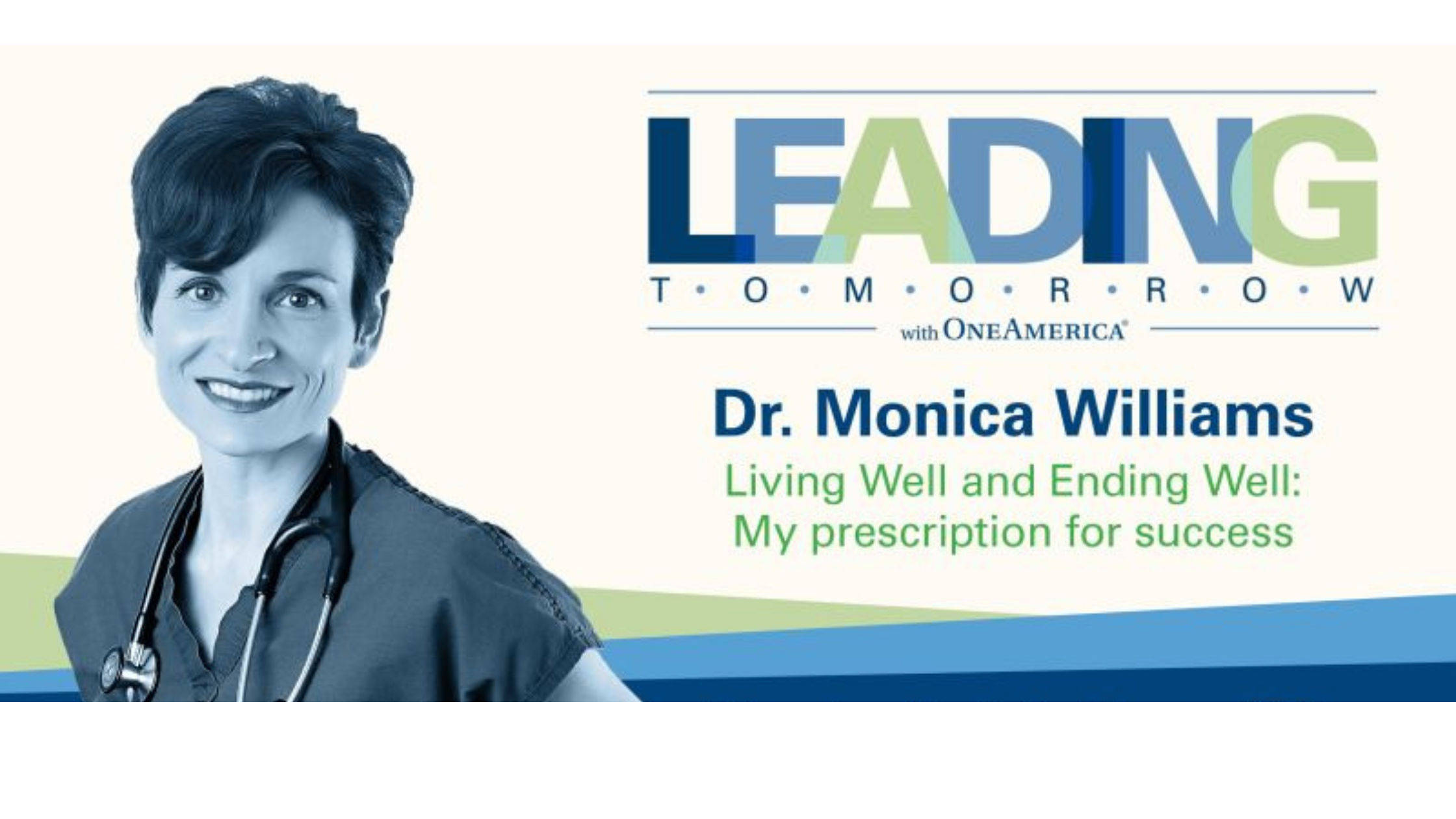As an emergency medicine physician for 20 years, including the past 12 years working in a large, level 1 trauma center, Dr. Monica Williams has seen innumerable patients and families facing long-term care challenges. As the Medical Director for Advance Care Planning and End of Life Education for the third-largest community-owned hospital system in the United States, she has spent a portion of her career talking to doctors about how they can have effective advanced medical planning and end-of-life conversations with patients and families.
Several years ago, during a conversation with a OneAmerica sales director, she realized that financial professionals are having, and sometimes struggling with, these same types of conversations. On September 9th at 2 pm eastern, the Leading Tomorrow with OneAmerica webinar series will feature Dr. Williams and her presentation, “You’re the Doctor Now: Guidance for Graceful Endings.”
“We have the same problems in both industries,” Dr. Williams said. “The barriers to having long-term care conversations are the same as the barriers to having advanced care planning conversations.”
Financial Professionals Make Plans Doctors Put Into Action
Dr. Williams said that she has developed a strong appreciation for the work that financial professionals do to prepare families for long-term care and end-of-life scenarios.
“I activate the plans that you’ve put in place, so I’m on the receiving end of your work, whether someone has a long-term care plan or not,” she said. “I know the boots-on-the-ground results of you having done this work with your clients.”
Planning is necessary, she says, to ensure that patients receive the medical treatment they need but are also treated with dignity. It is also necessary to ensure families do not face dire financial consequences.
“If we don’t have clear plans in place and haven’t had these conversations with our families about what we want and don’t want, what happens, typically, is the medical train takes over and drives you down this track, which is a high-cost, high-intervention track and usually does not lead to peace at the end of life,” she says. “So we have to have these very frank conversations about what we want and don’t want. The families that have plans and resources are the ones that can most easily bring their loved ones home, provide caregivers, make sure everyone’s needs and wishes are addressed at the end of life, and make this as peaceful as possible.”
“The best pathway costs less,” she added. “And the best pathway also includes plans to support the family in providing care for the loved one.”
LTC Conversations in Practice
In her presentation, Dr. Williams gives financial professionals a first-hand tour of a typical shift she works in the trauma center, including conversations she regularly has with patients about their long-term care needs. These conversations illustrate how long-term care planning can make a meaningful difference in their lives.
“I want you to see the product of your work,” she said.
She then offers advice based on her years of experience that financial professionals can use to have long-term care conversations more easily with clients and their families. The goal, she says, is “to make it digestible for all of us and, really, to create a peaceful end-of-life scenario and to create a safety net for patients and families.”
LTC Planning Is More Important Than Ever
COVID-19 has shined a spotlight on the issues of chronic long-term illness and end-of-life planning and creates an opportunity for financial professionals to address people’s heightened concerns. The pandemic, Dr. Williams said, has “brought these issues back to the dinner table, because it’s happening to our families, people we know, our neighbors.”
“Although this is a profoundly destructive pandemic and universal crisis, crises often contain the seeds of opportunity,” she said. “So I think there’s a big opportunity for your profession to tap into the concern and interest that’s already there, that’s being created by the pandemic.”
Register for the September 9th webinar with Dr. Williams and future events in the Leading Tomorrow with OneAmerica webinar series here.
OneAmerica is a NAIFA partner and a sponsor of NAIFA’s Limited and Extended Care Planning Center. The LECP Center empowers professionals to network with solution and service providers to share best practices, directly access subject matter experts, research, training, and resources; and provide thought leadership so we may continue to address the changing needs of the market.












-CMYK.png?width=200&name=LifeSecureLogo(F)-CMYK.png)



%20.png?width=148&height=55&name=b.%20RSSA_Logo_(R)%20.png)


